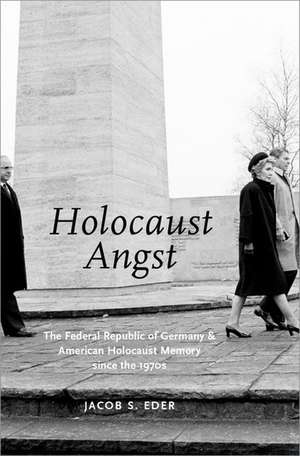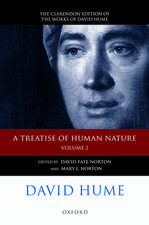Holocaust Angst: The Federal Republic of Germany and American Holocaust Memory since the 1970s
Autor Jacob S. Ederen Limba Engleză Hardback – 18 aug 2016
| Toate formatele și edițiile | Preț | Express |
|---|---|---|
| Paperback (1) | 178.13 lei 10-17 zile | |
| Oxford University Press – 4 aug 2021 | 178.13 lei 10-17 zile | |
| Hardback (1) | 321.48 lei 31-38 zile | |
| Oxford University Press – 18 aug 2016 | 321.48 lei 31-38 zile |
Preț: 321.48 lei
Preț vechi: 366.53 lei
-12% Nou
Puncte Express: 482
Preț estimativ în valută:
61.52€ • 65.78$ • 51.29£
61.52€ • 65.78$ • 51.29£
Carte tipărită la comandă
Livrare economică 07-14 aprilie
Preluare comenzi: 021 569.72.76
Specificații
ISBN-13: 9780190237820
ISBN-10: 0190237821
Pagini: 318
Ilustrații: 16 illus.
Dimensiuni: 248 x 165 x 32 mm
Greutate: 0.5 kg
Editura: Oxford University Press
Colecția OUP USA
Locul publicării:New York, United States
ISBN-10: 0190237821
Pagini: 318
Ilustrații: 16 illus.
Dimensiuni: 248 x 165 x 32 mm
Greutate: 0.5 kg
Editura: Oxford University Press
Colecția OUP USA
Locul publicării:New York, United States
Recenzii
Shines a bright light on the Kohl generation's paranoia about German victimization at the hands of Jews.
What makes Holocaust Angst stand out is the vast network of actors involved in the coordinated effort to shape American memory culture—diplomats, politicians, nonprofit groups, think tanks, and charitable foundation....Eder has produced a wonderful, detailed analysis of the transnational nature of memory politics and how Holocaust memory became increasingly internationalized over the past four decades.
[F]ascinating....Basing his book on a remarkable breadth of previously untapped archival sources, Eder has produced an original and nuanced analysis of the transnational politics of Holocaust memory. The book reveals the vast circle of political, cultural, and academic elites who played a part in this process. This important monograph should be read by those interested in Germany's efforts to confront its past and in memory studies in general. Not only does it illuminate how fear and perception can drive foreign policy, but it is also a timely reminder that democratic states--not simply dictatorial regimes--have devoted significant effort and resources to shaping and rewriting the narratives of the past for contemporary political purposes.
[O]ffers an original and important interpretation of the changes in and controversies surrounding Holocaust memory from the 1970s through the 1990s....Eder successfully reconstructs the multiple networks and colorful personalities involved in the politics of Holocaust memory, their varied actions, and the pervasive angst in elite government, foundation, and academic circles....Holocaust Angst will be of interest to scholars and students in a variety of fields including not only Holocaust memory and the politics of history but also German-American relations in the rather neglected decades of the 1980s and 1990s, and Cold War cultural diplomacy. It revises our understanding of how Germans tried to come to terms with the Nazi past, and it illustrates how productive a transatlantic approach to the politics of history and memory can be.
The title of the book, Holocaust Angst, is eye-catching and helps dramatize a littleknown chapter in history. The information about the role played by German historians, knowingly or unknowingly, in the political game is illuminating, and puts the average reader on the alert concerning important historical debates. Eder's book is highly recommended for scholars as well.
[O]ffer[s] a quick tour of the difficult journey German society took after World War II by addressing Germany's inability to face the truth of the implication that Germans were potential Nazi collaborators, either by deceit or coercion. By addressing the confused feelings Germans experience when working through their past... [Eder] present[s] important new possibilities for Holocaust research.
This fascinating book shows how Holocaust memory in Germany was transformed from a burden to a special responsibility. Engagement with America, stereotypes about Jews, Cold War calculations, and scholarly integrity emerge as key factors in Eder's provocative analysis. Insightful, original, and meticulously researched, this is contemporary, transnational history at its best.
Eder is the first historian to have exploited a wide variety of archival sources, most notably documentation of the Helmut Kohl government regarding its 'politics of history' and the internal records of the body that was responsible for planning the U.S. Holocaust Museum in Washington. What emerges from this research is a picture of a German leadership that was obsessed by fears that the emergence of Holocaust memory culture in the United States would threaten Germany's interests and reputation. Eder has produced an excellent and thoroughly original work of scholarship that should be read by anyone who wants to understand post-1945 German efforts to come to terms with the past.
In Holocaust Angst Jacob Eder ably examines the confrontation of the West German government led by Chancellor Helmut Kohl with American Jewish organizations in the 1980s and 1990s. He draws on published and archival sources to shed light on the Bitburg controversy, West German policy toward Israel and the Middle East, efforts to influence themes in the United States Holocaust Memorial Museum in Washington, D.C. and policy toward the nature of memorials to the Holocaust in West Germany. Part of Eder's distinctive and important contribution is to underscore the trans-Atlantic dimensions of what is often told as a strictly internal, West German history.
Sheds an unusual and intriguing light on the hidden politics of history under West German Chancellor Kohl, and reveals continuing sensitivities among the German political elite concerning the 'Americanization' of the Holocaust in the 1980s and 1990s. An important book which illuminates the significance of behind the scenes German-American relations at this time.
[E]xcellent... Eder has produced a wonderful, detailed analysis of the transnational nature of memory politics and how Holocaust memory became increasingly internationalized over the past four decades.
What makes Holocaust Angst stand out is the vast network of actors involved in the coordinated effort to shape American memory culture—diplomats, politicians, nonprofit groups, think tanks, and charitable foundation....Eder has produced a wonderful, detailed analysis of the transnational nature of memory politics and how Holocaust memory became increasingly internationalized over the past four decades.
[F]ascinating....Basing his book on a remarkable breadth of previously untapped archival sources, Eder has produced an original and nuanced analysis of the transnational politics of Holocaust memory. The book reveals the vast circle of political, cultural, and academic elites who played a part in this process. This important monograph should be read by those interested in Germany's efforts to confront its past and in memory studies in general. Not only does it illuminate how fear and perception can drive foreign policy, but it is also a timely reminder that democratic states--not simply dictatorial regimes--have devoted significant effort and resources to shaping and rewriting the narratives of the past for contemporary political purposes.
[O]ffers an original and important interpretation of the changes in and controversies surrounding Holocaust memory from the 1970s through the 1990s....Eder successfully reconstructs the multiple networks and colorful personalities involved in the politics of Holocaust memory, their varied actions, and the pervasive angst in elite government, foundation, and academic circles....Holocaust Angst will be of interest to scholars and students in a variety of fields including not only Holocaust memory and the politics of history but also German-American relations in the rather neglected decades of the 1980s and 1990s, and Cold War cultural diplomacy. It revises our understanding of how Germans tried to come to terms with the Nazi past, and it illustrates how productive a transatlantic approach to the politics of history and memory can be.
The title of the book, Holocaust Angst, is eye-catching and helps dramatize a littleknown chapter in history. The information about the role played by German historians, knowingly or unknowingly, in the political game is illuminating, and puts the average reader on the alert concerning important historical debates. Eder's book is highly recommended for scholars as well.
[O]ffer[s] a quick tour of the difficult journey German society took after World War II by addressing Germany's inability to face the truth of the implication that Germans were potential Nazi collaborators, either by deceit or coercion. By addressing the confused feelings Germans experience when working through their past... [Eder] present[s] important new possibilities for Holocaust research.
This fascinating book shows how Holocaust memory in Germany was transformed from a burden to a special responsibility. Engagement with America, stereotypes about Jews, Cold War calculations, and scholarly integrity emerge as key factors in Eder's provocative analysis. Insightful, original, and meticulously researched, this is contemporary, transnational history at its best.
Eder is the first historian to have exploited a wide variety of archival sources, most notably documentation of the Helmut Kohl government regarding its 'politics of history' and the internal records of the body that was responsible for planning the U.S. Holocaust Museum in Washington. What emerges from this research is a picture of a German leadership that was obsessed by fears that the emergence of Holocaust memory culture in the United States would threaten Germany's interests and reputation. Eder has produced an excellent and thoroughly original work of scholarship that should be read by anyone who wants to understand post-1945 German efforts to come to terms with the past.
In Holocaust Angst Jacob Eder ably examines the confrontation of the West German government led by Chancellor Helmut Kohl with American Jewish organizations in the 1980s and 1990s. He draws on published and archival sources to shed light on the Bitburg controversy, West German policy toward Israel and the Middle East, efforts to influence themes in the United States Holocaust Memorial Museum in Washington, D.C. and policy toward the nature of memorials to the Holocaust in West Germany. Part of Eder's distinctive and important contribution is to underscore the trans-Atlantic dimensions of what is often told as a strictly internal, West German history.
Sheds an unusual and intriguing light on the hidden politics of history under West German Chancellor Kohl, and reveals continuing sensitivities among the German political elite concerning the 'Americanization' of the Holocaust in the 1980s and 1990s. An important book which illuminates the significance of behind the scenes German-American relations at this time.
[E]xcellent... Eder has produced a wonderful, detailed analysis of the transnational nature of memory politics and how Holocaust memory became increasingly internationalized over the past four decades.
Notă biografică
Jacob S. Eder is a Research Fellow and Lecturer at the Friedrich-Schiller-University Jena.











